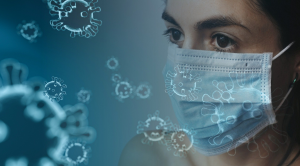
In a 2015 review of the research literature, the selenium researchers Holger Steinbrenner and Helmut Sies from the Heinrich-Heine-University in Düsseldorf, Germany, give an overview of the effect of selenium status and supplementation in infectious diseases caused by viruses (e.g. HIV, influenza A virus, hepatitis C virus, polio virus, West Nile virus) and bacteria (e.g. M. tuberculosis, Helicobacter pylori) [Steinbrenner 2015].
- Deficient intake and status of the essential trace element selenium are associated with viral and bacterial infections.
- In the absence of adequate selenium status, otherwise benign strains of Coxsackie viruses and influenza viruses can mutate to highly virulent strains.
- Nutritional supplementation with selenium supply to boost selenium status seems to confer health benefits for patients suffering from some viral diseases, in particular patients with HIV and influenza A virus infections.
- Multi-micronutrient supplements containing selenium have been shown to improve several clinical and lifestyle variables in patients co-infected with HIV and Mycobacterium tuberculosis.
- Selenium status may affect the function of cells of both adaptive and innate immunity.
- Supplemental intakes of selenium are associated with the enhanced proliferation and differentiation of naive CD4-positive T lymphocytes toward T helper 1 cells, thereby supporting the acute cellular immune response.
- Similarly, supplemental intakes of selenium are associated with the directing of macrophages toward the M2 type, thereby counteracting the excessive activation of the immune system with resulting host tissue damage.
- Data from epidemiological studies and intervention trials, with selenium administered alone or in combination with other micronutrients have shown that selenium status and intake affect immune system functions.
Selenium Status and Intake
In her 2012 review article in The Lancet, the selenium researcher Margaret P. Rayman points out that selenium intakes average 40 micrograms/day in Europe compared with 93 micrograms/day for women and 134 micrograms/day for men in the United States. Nutritional supplements can provide an additional 50–200 micrograms of selenium per day [Rayman 2012].
Steinbrenner and Sies report that the Tolerable Upper Intake Level is set at 300–450 micrograms of selenium per day. They point out that people who take a daily multivitamin and mineral tablet should be aware of the selenium content in the tablet.
In a 2010 study to establish optimal selenium intakes, Hurst et al reported that healthy men and women aged 50-64 years and living in the United Kingdom had a mean baseline plasma selenium concentration of 95.7 +/- 11.5 micrograms/L.
- Ten weeks of supplementation with 50 micrograms of selenium in selenium-enriched yeast increased the plasma selenium concentration to 118.3 +/- 13.1 micrograms/L.
- Ten weeks of supplementation with 100 micrograms of selenium in selenium-enriched yeast increased the plasma selenium concentration to 152.0 +/- 24.3 micrograms/L.
- Ten weeks of supplementation with 200 micrograms of selenium in selenium-enriched yeast increased the plasma selenium concentration to 177.4 +/- 26.3 micrograms/L.
In Figure 3 in her 2012 article, Professor Rayman indicates that the effect of selenium status on health and disease may display as a U-shaped curve. Her graph shows that the optimal serum selenium status for reduced risk of all-cause mortality lies between approximately 110 micrograms/L and 170 micrograms/L [Rayman 2012].
Best Form of Selenium Supplement
In a 2014 randomized, double blind, placebo-controlled trial, researchers from Penn State University showed that selenium-enriched yeast supplements but not selenomethionine supplements are significantly associated with a reduction in bio-markers of oxidative stress in healthy men. Their findings suggest that there are selenium-containing compounds other than selenomethionine that account for the decrease in oxidative stress [Richie 2014]. This finding is especially intriguing because earlier clinical trials have suggested that selenium-enriched yeast but not selenomethionine may be effective at reducing prostate cancer risk.
Take-home Message: Selenium and Immune System
- Adequate selenium status is necessary for immune system protection against viral and bacterial infections.
- There are regional differences in the availability of selenium in the diet.
- Selenium intakes sufficient to achieve and maintain a serum selenium status between approximately 110 and 170 micrograms per liter seem to be advisable. It is possible to have one’s serum selenium status tested.
- Selenium-enriched yeast supplements containing as many as 20 different species of selenium seem to be a better choice than single-species selenomethionine supplements.
Sources
Hurst R, Armah CN, Dainty JR, Hart DJ. Establishing Optimal Selenium Status: Results of a Randomized, Double-Blind, Placebo-Controlled Trial; Am J Clin Nutr 2010; 91: 923-31.
Rayman MP. Selenium and Human Health. Lancet 2012; 379: 1256-68.
Richie JP, Das A, Calcagnotto AM, Sinha R, & Berg A. Comparative Effects of Two Different Forms of Selenium on Oxidative Stress Biomarkers in Healthy Men: A Randomized Clinical Trial. Cancer Prev Res (Phila) 2014; 7: 796-804.
Steinbrenner H, Al-Quraishy S, Dkhil MA, Wunderlich F. & Sies H. Dietary Selenium in Adjuvant Therapy of Viral and Bacterial Infections. Adv Nutr 2015; 6:73–82.
The information presented in this review article is not intended as medical advice and should not be used as such.
30 June 2020
